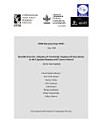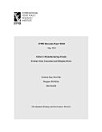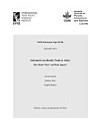Do agricultural projects help smallholders transition to better livelihood strategies?
Hazell, Peter · Timu, Anne G. · Savastano, Sara · Massotti, Piero
IFPRI Discussion Paper Bog 1 · Intl Food Policy Res Inst
E-bog
29
Sider
family_home
Kvalificeret
info
reportBedømmelser og anmeldelser verificeres ikke Få flere oplysninger
Om denne e-bog
Agricultural projects typically aim to promote the uptake of project components amongst targeted farm populations to improve their on-farm productivity within a “theory of change” that leads to improvements in their welfare. While this approach can be an important first step towards improving smallholder livelihoods, it ignores alternative and often superior livelihood options that might arise within the rural transformation process. These options can be particularly important for agricultural value chain projects that generate new market opportunities and secondary off-farm income and employment growth within the rural nonfarm economy. We argue that the design of smallholder projects implemented within regions already undergoing a dynamic transformation and/or on projects which have significant value chain components, should be broadened to assist smallholders make successful transitions to their best livelihood options. For such projects, M&E should also track livelihood transitions as well as the usual assessments of progress made, the achievement of expected goals, and the identification of bottlenecks in implementation. To help operationalize such an approach, we propose a typology of smallholder livelihood strategies that can track transitions over time and illustrate its use with an IFAD funded agricultural value chain project in Malawi. Using econometric methods and available household panel data, we find that the project helped some smallholders transition out of subsistence farming to market farming with a corresponding increase in their per capita incomes. The project also helped some households transition to, or remain with, an off-farm income diversification strategy with favorable per capita income outcomes. This may reflect new opportunities that arose as spillover benefits from the project along local agricultural value chains and within the rural nonfarm economy more broadly. We conclude with some lessons for the design, monitoring and evaluation of future agricultural projects.
Bedøm denne e-bog
Fortæl os, hvad du mener.
Oplysninger om læsning
Smartphones og tablets
Installer appen Google Play Bøger til Android og iPad/iPhone. Den synkroniserer automatisk med din konto og giver dig mulighed for at læse online eller offline, uanset hvor du er.
Bærbare og stationære computere
Du kan høre lydbøger, du har købt i Google Play via browseren på din computer.
e-læsere og andre enheder
Hvis du vil læse på e-ink-enheder som f.eks. Kobo-e-læsere, skal du downloade en fil og overføre den til din enhed. Følg den detaljerede vejledning i Hjælp for at overføre filerne til understøttede e-læsere.






